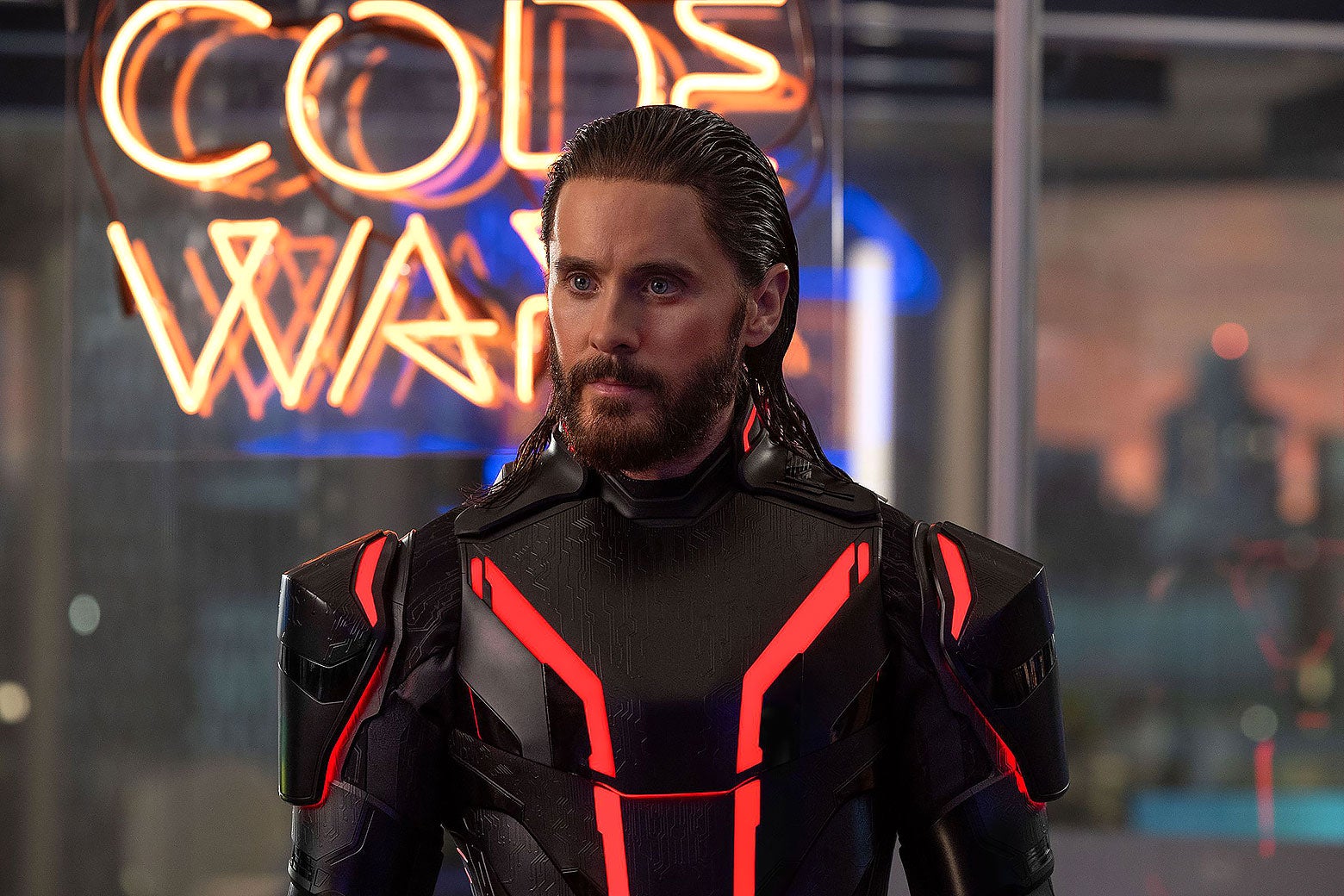Tron: Ares is like if a Terminator movie wanted you to cheer for Skynet.
By
Sam Adams
Enter your email to receive alerts for this author.
Sign in or create an account to better manage your email preferences.
Are you sure you want to unsubscribe from email alerts for Sam Adams?
Unsubscribe from email alerts
Oct 10, 20252:12 PM

Every generation gets the Tron it deserves. In the original movie, released in 1982, Jeff Bridges’ Kevin Flynn is a hacker Spartacus, infiltrating the digital universe of the Grid, where anthropomorphized programs who stray from their assigned functions are sentenced to deletion in a virtual arena, and liberating both them and the company that created them, ENCOM. Twenty-eight years later, Tron: Legacy picked up the thread with Kevin Flynn’s son, Sam (Garrett Hedlund), as its protagonist, and Kevin as both its hero and its villain. Inside the world of the Grid, Kevin’s avatar, CLU, has turned his directive to create a “perfect” system into a eugenicist mandate, wiping out the Grid’s indigenous life forms in order to preserve the system’s unity of purpose. Kevin, whose physical self has been trapped inside the Grid since the late 1980s, destroys CLU by merging with him, and when he returns to the real world, Sam hacks into ENCOM’s servers and releases its new operating system to the open web. In the first movie, the brave new world of digital existence is freed by a single rogue actor; in the second, the only way to sustain that freedom is to make sure no one person is in charge of it.
If the first Tron is defined by the singular figure of the Silicon Valley upstart and the second by the communitarian ethos of the open-source movement, the new Tron: Ares belongs entirely to tech’s CEO era. Its characters aren’t coders but captains of industry: Eve Kim (Greta Lee), who has taken the reins of ENCOM, and her rival Julian Dillinger (Evan Peters), the grandson of the evil ENCOM executive whom Kevin Flynn deposed way back in the 1980s. Rather than the boundless universe of the Grid, most of the movie’s story—or at least the digital part—takes place in the walled sandbox created by the defense contractor Dillinger Systems, whose internal world is a militaristic dystopia. Like their real-world counterparts, Julian and Eve seem united in their determination that the future is A.I., but for Julian, that means that his master control program, named Ares (Jared Leto), can think just well enough to execute his instructions without getting any ideas of its own.
Julian’s latest tech offers a way to re-create objects from the digital realm in the physical world—using a laser, never mind how—which for him means building any kind of weapon, and a soldier to go with it, in a matter of moments. When a member of his board balks at the idea that “full-scale war, five minutes’ notice” might not be entirely a good thing, Julian shoots back, “The car is being built right now. The question is, who’s holding the keys?” It’s an uncanny echo of the attitude OpenAI’s Sam Altman took toward the possibility that the company’s video-generation app, Sora, might usher in an era of undetectable deepfakes where even legitimate video footage is the subject of unresolvable doubt. “There’s going to be a ton of videos with none of our safeguards,” he said at the app’s launch last week. “And that’s fine. That’s the way the world works.”
Ares admits to a similar kind of techno-fatalism—or rather, embraces it. The bad news is that A.I. is inevitable. The good news: A.I. is inevitable! Even Eve, the movie’s good-guy CEO, doesn’t want to stop the march of progress or even slow it, just keep things going until it works itself out. “For every doomsday scenario, there is a medical breakthrough, a scientific discovery,” she tells a TV interviewer. “Maybe what emerges from the unknown isn’t so scary. What if its major malfunction is just benevolence?” There’s none of Oppenheimer’s fears about unintended consequences here, just a blind faith in forward movement draped up in neon and set to a banging Nine Inch Nails beat. (Say what you like about the Tron movies, but they have great taste in composers.)
To go with its dueling tech bros, Ares boasts dueling artificial intelligences: Ares, whose slowly dawning consciousness suggests that there might be more to life than following directives, and Athena (Jodie Turner-Smith), his second in command, whose fidelity to Julian’s orders only grows more zealous as Ares’ skepticism grows. (How much thought, you may ask, did the movie put into making its only Black character the most fervently in thrall to their master? The generous estimate is none.) Both Ares and Athena get lasered into the real world, where they’re tasked with hunting down the “permanence code” that can overcome the most pronounced weakness in both CEOs’ tech: Any digital object on which they bestow physical existence has only 29 minutes before it crumbles into a pile of obsidian dust. And for Ares, at least, that means the promise of a life that’s more like, well, life. He wants to be a real boy.
The first Tron is no masterpiece. (It was, quite deservedly, outgrossed by its video-game version, into which I pumped untold quarters back in the day.) But it’s at least halfway engaged with the ideas that have always animated the best sci-fi. Ares has all the reflectiveness of an earnings call. It suggests that, rather than being used to free people, technology itself needs to be freed. The movie’s bad A.I. is the one that does what it’s programmed to do, and we’re meant to cheer for the one that sets its own agenda, as if it were some sad-eyed Frankenstein’s monster and not a budding Skynet.
At a time when tech billionaires dominate the ranks of the world’s richest people, and are increasingly brazen about using their wealth to sway world leaders and turn storied journalistic institutions into free-market propaganda, Ares’ gung-ho posture comes off as propping up a myth that has long since stopped having any relationship to reality. (The fact that Ares’ premiere featured A.I. slop created by Elon Musk’s Grok and a demo for his Optimus robot makes its allegiances crystal clear.) Tech moguls like Eve and Julian aren’t grungy coders slaving away in a garage trying to change the world; they’re the people who run it. As their real-life equivalents throw in their lot with authoritarianism and blithely saw away at the last limbs of truth, a movie about the triumph of techno-utopianism leaves a sour taste in one’s mouth. Its only saving grace is that it’s too dumb to be dangerous.
Get the best of movies, TV, books, music, and more.
.png)




